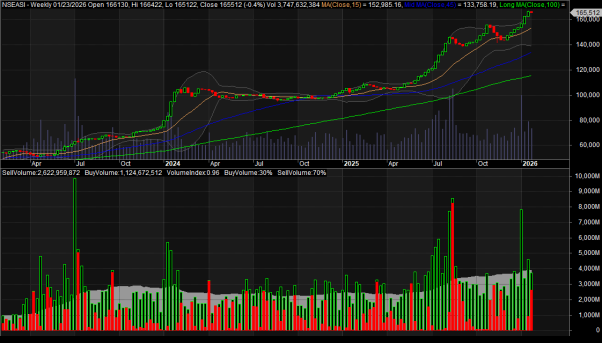
Lagos, Nigeria headquartered United Bank for Africa Plc, styled Africa’s global bank, on Thursday presented its performance score-card for the first nine months of 2025 to the Nigerian Exchange, highlights of which included the 10.08% growth in interest income and 16.26% interest expense growth, with a slowdown in net trading and foreign exchange income constraining profit. The impact of this was however muted by the equally significant 53.92% drop in net impairment charge on loans and receivables, suggesting an improvement in its risk management capacity.
On the final analysis, net profit for the period jumped to N537.527bn from N525.313bn, translating to Earnings Per Share of N13.56, a drop from the N15.15 each reported in the corresponding period of last year, owing to the group’s ongoing capital raising exercise to enable it meet the minimum threshold of N500bn set by its primary regulator- the Central Bank of Nigeria (CBN) ahead of the March 31, 2026 deadline.

On the balance sheet, UBA Plc’s total assets rose from N30.323tr as of December 31, 2024 to N32.491tr, with cash and bank balances as the biggest contributor, accounting for N9.114tr, from N8.163tr, ahead of customer loans and advances which rose from N6.954tr to N7.198tr in the nine-month period. Total liabilities stood at N28.19tr from N26.904tr, lifted mainly by customer deposits of N23.799tr, a leap from N21.894tr; leaving shareholders’ fund of N4.176tr, up from N3.316tr at the end of 2024.
Gross earnings for the period rose to N2.468tr from N2.398tr, with interest income of N1.98tr, compared to the previous N1.798tr; this continues to be driven by interest income on term loans to corporates, which amounted to N508.237bn, from N539.074bn; and income from investment securities from treasury bills which fetched N545.378bn, from N294.277bn; and bonds amouning to N428.59bn from N456.212bn.
Interest expense rose by N113.145bn from N695.571bn to N808.716bn, the bulk of which was the N459.161bn paid on customer deposits, from N404.995bn; resulting in net interest income of N1.171tr, against the N1.103tr reported in the similar period of last year.
Fee and commission income improved from N392.839bn to N407.955bn, driven by the N157.506bn earned from electronic banking from N144.487bn; fee and commission expense stood at N1.73.113bn from N158.986bn, the lion’s share of which was the N133.018bn paid in electronic banking expense, from N135.415bn.
Net trading and foreign exchange income fell to N41.357bn from N182.484bn, a breakdown of which showed that while income from fixed income securities yielded N106.454bn from N83.103bn; foreign exchange trading income slipped from N91.391bn to N57.039bn; while foreign currency revaluation gain fell the most from N251.366bn to N41.868bn; just as net fair value gain on derivatives dropped from N243.376bn to N164.004bn.
Other operating income N39.316bn from N23.785bn; while net monetary loss as hyperinflation rose mildly to N5.544bn from N4.282bn; bringing total non-interest income to N310.075bn, a decline from last year’s N435.84bn; and operating income to N1.481tr from N1.539tr.
Net impairment charge on loans and receivables dropped by N66.588bn to N56.89bn from N123.478bn. Specifically, impairment charge on customer loans for the period fell from N142.495bn to N84.971bn; allowance for impairment charge on loans to bank jumped to N4.23bn from just N124m; write-off on loans and advances also rose to N7.334bn from N1.241bn. The figure got a big boost by way of a N50.423bn recoveries on loans previously written-off, almost three times the N18.238bn recovered in the previous nine months. Impairment charge on investment securities stood at N2.781bn from N2.399bn; that on off-balance sheet items stood at N3.945bn, compared to the previous N1.129bn reversal; while impairment charge on other assets amounted to N3.216bn, compared to the N3.583bn reversal
resulting in net operating income after impairment loss on loans and receivables of N1.424tr, up from N1.415tr.
Employee benefit expenses increased from N225.418bn to N270.833bn; depreciation and amortisation rose to N45.499bn from N33.823bn; just as other operating expenses dropped marginally to N529.817bn from N552.961bn, the bulk of which were the N105.342bn spent on fuel, repairs and maintenance, up from N104.073bn; and the N92.886bn paid to the Asset Management Corporation of Nigeria (AMCON) as banking sector resolution cost, which increased from N70.325bn in the similar period of last year. Total operating expenses, therefore, stood at N846.149bn from N812.202bn; with profit before tax dropping from N603.483bn in the comparative period of 2024 to N578.597bn; a drop in income tax expense from N78.17bn in 2024 to N41.07bn, resulted in net profit of 537.527bn, up from N525.313bn












